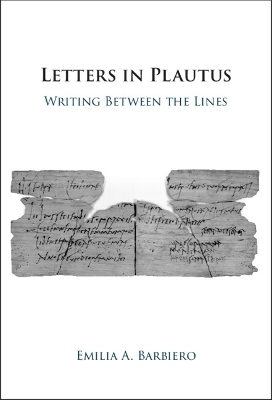
Letters in Plautus
Writing Between the Lines
Seiten
2022
Cambridge University Press (Verlag)
978-1-009-16851-9 (ISBN)
Cambridge University Press (Verlag)
978-1-009-16851-9 (ISBN)
Illuminates the origins of the earliest surviving poetry written in Latin and addresses a question that has vexed readers of Plautine comedy since the birth of modern philology: how did Plautus translate? Of interest to scholars of Latin poetry, the Roman Republic, book history and the history of western drama.
The letters in Plautus are potent tools for making and thinking about Plautine comedy inside Plautine comedy. Emilia Barbiero demonstrates that Plautus' embedded letters reify the internal performance and evince its theatricality by means of the epistolary medium's script-like ability to precipitate presence in absence. These missives thus serve as emblems of the dramatic script, and in their onstage composition and recitation they cast a portrait of the plays' textual origins into the plays themselves. But by virtue of their inscription with a premise which is identical to that of the comedies they inhabit, the Plautine letters also reproduce the relationship between the playwright's Greek models and his Latin translations: the mirror effect created by a dramatic text inscribed, read and realized within a dramatic text whose plot it also duplicates generates a mise-en-abyme which ultimately serves to contemplate problems of novelty and literary ownership that beset Plautus' literary endeavor.
The letters in Plautus are potent tools for making and thinking about Plautine comedy inside Plautine comedy. Emilia Barbiero demonstrates that Plautus' embedded letters reify the internal performance and evince its theatricality by means of the epistolary medium's script-like ability to precipitate presence in absence. These missives thus serve as emblems of the dramatic script, and in their onstage composition and recitation they cast a portrait of the plays' textual origins into the plays themselves. But by virtue of their inscription with a premise which is identical to that of the comedies they inhabit, the Plautine letters also reproduce the relationship between the playwright's Greek models and his Latin translations: the mirror effect created by a dramatic text inscribed, read and realized within a dramatic text whose plot it also duplicates generates a mise-en-abyme which ultimately serves to contemplate problems of novelty and literary ownership that beset Plautus' literary endeavor.
Emilia A. Barbiero is an Assistant Professor of Classics at New York University. She has published extensively on Plautus and on ancient letters both Greek and Latin.
List of Critical Editions; Note on the Text; Introduction; 1. Bacchides: A Scene of Writing; 2. Persa: Whose Play Is It Anyway?; 3. Pseudolus: Fake It Till You Make it; 4. Curculio: The Ring Is a/the Thing; 5. Epidicus and Trinummus: The Roads Not Taken; Postscripts; Appendix: Text, Reading and Writing in Plautus; Bibliography.
| Erscheinungsdatum | 07.12.2022 |
|---|---|
| Zusatzinfo | Worked examples or Exercises |
| Verlagsort | Cambridge |
| Sprache | englisch |
| Maße | 159 x 236 mm |
| Gewicht | 500 g |
| Themenwelt | Geschichte ► Allgemeine Geschichte ► Vor- und Frühgeschichte |
| Geisteswissenschaften ► Sprach- / Literaturwissenschaft ► Anglistik / Amerikanistik | |
| Geisteswissenschaften ► Sprach- / Literaturwissenschaft ► Literaturwissenschaft | |
| ISBN-10 | 1-009-16851-7 / 1009168517 |
| ISBN-13 | 978-1-009-16851-9 / 9781009168519 |
| Zustand | Neuware |
| Informationen gemäß Produktsicherheitsverordnung (GPSR) | |
| Haben Sie eine Frage zum Produkt? |
Mehr entdecken
aus dem Bereich
aus dem Bereich
Was Pompeji über uns erzählt
Buch | Hardcover (2023)
Propyläen (Verlag)
32,00 €
auf den Spuren der frühen Zivilisationen
Buch | Hardcover (2023)
C.H.Beck (Verlag)
20,00 €


